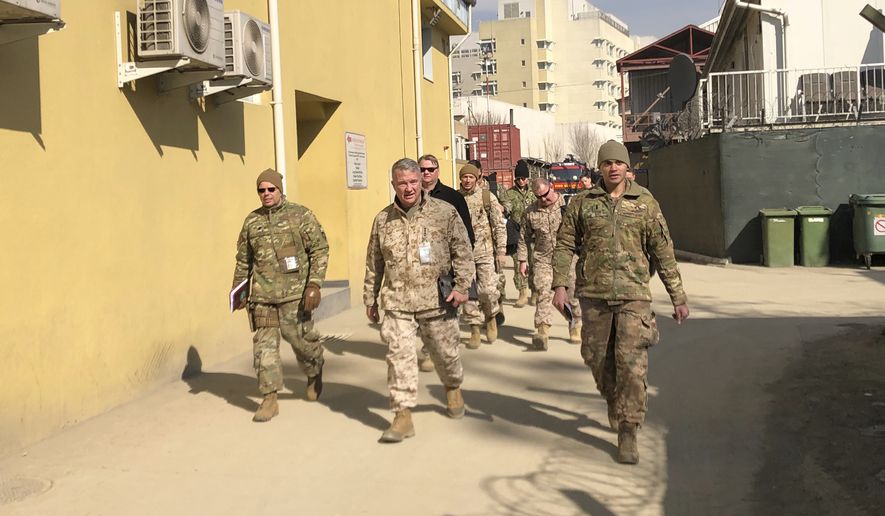The Pentagon will withdraw a third of its 13,000 combat troops in Afghanistan by this summer, the top U.S. general commanding Middle East operations said Tuesday, but the removal of the remainder of the force is in serious question amid ongoing violence by the insurgent Taliban movement.
Speaking to the House Armed Services Committee, Gen. Frank McKenzie, commander of U.S. Central Command, said the military is following through on its part of a landmark peace agreement the Trump administration struck with the Taliban late last month to reduce the number of American troops in the country, but he also told lawmakers he has “no confidence” in the Taliban’s willingness to pursue a peace process with the U.S.-backed Afghan government in Kabul.
“We’re going to go to 8,600 by the summer. Conditions on the ground will dictate if we go below that,” Gen. McKenzie said, adding, “To date, Taliban attacks are higher than we believe are consistent with an idea to actually carry out this plan.”
“If conditions on the ground are not permissive, my advice would be to not continue that reduction,” he said.
American troops began leaving Afghanistan Monday as part of the deal reached in Doha on Feb. 29, fulfilling a key campaign promise of Mr. Trump in 2016. But the landmark agreement, that marked the beginning of the end of America’s longest war, also called for a comprehensive nationwide cease-fire and the start of peace talks Tuesday in Norway with the U.S.-backed government in Kabul.
But ongoing violence — and deep divisions within the Kabul government — have led to a delay in the peace talks and mounting doubts that the warring Afghan parties can reach a durable deal.
Gen. McKenzie explained that Taliban forces have continued carrying out attacks that are “relatively low in scale” and not directed against coalition forces or major urban centers.
Even so, he added, the attacks are “not consistent with a movement toward a negotiated settlement, and they are not consistent with the undertaking [the Taliban] made. The Taliban need to keep their part of the bargain.”
Defense Secretary Mark Esper believes that, despite some violence, the U.S.-Taliban deal is holding, Pentagon spokesman Jonathan Hoffman told the Associated Press.
“While levels are not as low as some would like them to be, we’ve seen progress and we hope that that continues to hold,” Mr. Hoffman said, adding that Mr. Esper acknowledged a complete departure of U.S. forces is not an element of the deal.
A feud between Afghan President Ashraf Ghani and political rival Abdullah Abdullah — both of whom claim to have won the country’s September presidential election — has only complicated the diplomacy. But Mr. Ghani offered some hope of cutting a deal with his rival and announced he would begin assembling a negotiating team for the face-to-face talks with the Taliban.
In a tweet Tuesday, U.S. special representative for Afghanistan Zalmay Khalilzad said both Mr. Ghani and Mr. Abdullah are “open to negotiations to end the political crisis and that peace and reconciliation is the priority.”
As part of the peace negotiations, the Afghan government announced later that Mr. Ghani has signed an agreement to free Taliban prisoners — a crucial pre-condition for the Oslo talks.
Sediq Sediqqi, spokesperson for the Afghan government, said the decree “would facilitate the release of the Taliban prisoners in accordance with an accepted framework for the start of negotiation between the Taliban and the Afghan government.”
On Capitol Hill, Democratic lawmakers offered a more pessimistic view of Mr. Trump’s peacemaking efforts. Sen. Chris Murphy, Connecticut Democrat, said Tuesday he has grown “concerned … that Trump got fleeced,” with no long-term guarantee the Taliban will join a unity government after American and allied forces depart.
State Department spokeswoman Morgan Ortagus acknowledged the delay in starting direct Afghan talks, but said Mr. Ghani planned to announce “an inclusive team in the coming few days.”
But she echoed U.S. military complaints that the “current high level of violence by the Taliban is unacceptable.”
“This must change,” she said. “Violence at these levels risks drawing both sides into a vicious cycle, serves no one, and undermines peace.”
• Lauren Toms can be reached at lmeier@washingtontimes.com.




Please read our comment policy before commenting.